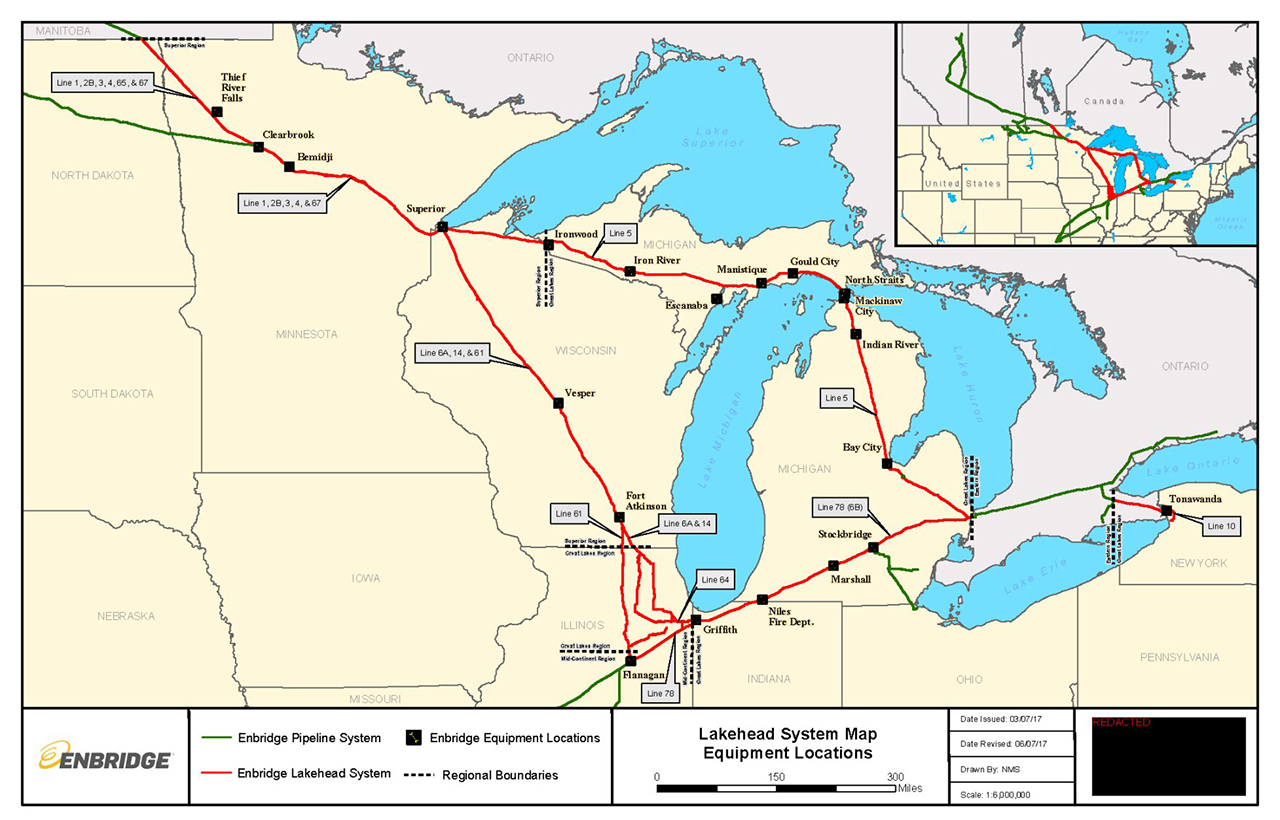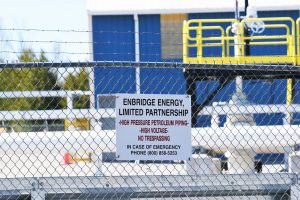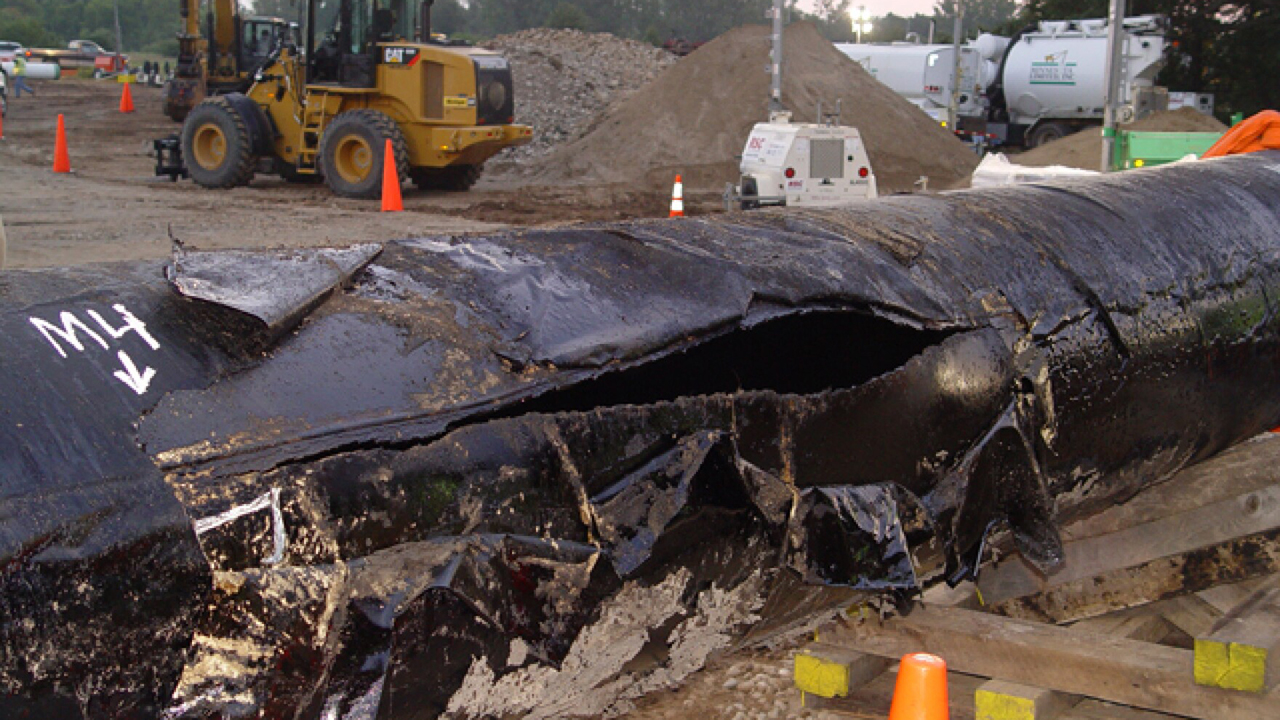Gas and oil industry report projects fuel price hikes if Enbridge Line 5 is shut down
A report for a gas and oil industry group predicts gasoline and diesel prices will jump and stay high in this region if Enbridge Energy’s Line 5 is shut down by politicians or the courts.

A report for a gas and oil industry group predicts gasoline and diesel prices will jump and stay high in this region if Enbridge Energy’s Line 5 is shut down by politicians or the courts. Gov. Gretchen Whitmer ordered the pipeline to shut down, but the Canadian company did not comply and went to court.
The news conference by phone from the Texas based Consumer Energy Alliance started out with a Michigan voice. Rep. Sara Cambensy, a Democrat from the Upper Peninsula, says Line 5 needs to continue to pump oil. She says a proposed tunnel under the Straits of Mackinac to house a replacement segment for the nearly 70-year-old pipeline is the only way to ensure energy security for the state.
“I found that those opposed to building the tunnel didn’t really have a plan,” Cambensy says. “They had no ideas and talking points about how they envision transporting fuel or propane.”

The experts who wrote the report said they were asked to look at whether fuel prices would be affected if Line 5 suddenly stopped operating.
Terry Clower is a professor of public policy at George Mason University. He and his partner say there’s never been a case where a pipeline was shut down by a state government, so they looked at a similar situation.
“We decided to look at what happens to fuel prices when refineries are shut down due to a disaster event like a hurricane,” Clower says.
Such as Katrina. In two instances hurricanes have caused refineries to shut down for long periods.
“We project that the restriction in fuel supplies will cause an increase of between 9.47 percent and 11.66 percent,” Clower says. “In the states of Ohio and Michigan that is on top of any other market-based increase.”
He said Michigan, but the report indicates southeast Michigan.
At today’s prices, the high side would amount to more than 40 cents a gallon.
Environmentalists think the report makes some wrong assumptions.
Sean McBrearty is with Clean Water Action. He says two refineries are not going to stop operating if Line 5 shuts down. All the refineries in Toledo and Marathon in Detroit get their oil from more than just Line 5.
“Actually they receive oil from several different sources,” McBrearty says. “They receive a small percentage of their oil from Line Five, and they would not be impacted in this way by a Line Five closure.”
Previously when asked how dependent it is on Line 5, Marathon said that’s not information it reveals. It’s proprietary.
Clower also notes that other refineries are generally operating at close to full tilt and even if they could take on more oil, “There does not appear to be an existing pipeline capacity to accommodate a shift to relying on other refineries to replace its lost production at the Toledo refineries.”
Clean Water Action’s McBrearty finds fault with that as well.
“It fails to take into account existing pipeline capacity when Line 6B spilled into the Kalamazoo, and it was rebuilt as the new line seventy eight. They actually doubled the capacity of the pipeline,” McBrearty says.

But we don’t know whether Enbridge is already using that capacity.
Although, in December the consultancy firm Wood Mackenzie reported only about half of the U.S. oil pipeline capacity is being used right now.
McBrearty adds that studies commissioned by three different environmental groups all indicate there would be a price increase if Line 5 shut down. But he says it would be much smaller than the Consumer Energy Alliance predicts.
He notes when Line 5 was mandated to shut down for two weeks and then at half capacity for a couple of months after that, fuel prices in the region didn’t budge.
Representative Cambensy says for more reasons than higher fuel prices, Michigan cannot afford to lose Line 5.
“Pipelines are the safest way to transport oil and gas,” Cambensy says. “They keep our jobs, our industry, our citizens and our businesses functioning. And we cannot afford to buy in to the false lies and tales that we’re being told.”
But some businesses that rely on the Great Lakes, Native American tribes, and others opposed to building a tunnel under the Straits for a new segment of Line 5 say none of us can afford an oil spill in the Great Lakes from the pipeline sitting on the lake bed. They say it’s nearly 70 years old now and it could take years longer to build a tunnel.
Trusted, accurate, up-to-date.
WDET strives to make our journalism accessible to everyone. As a public media institution, we maintain our journalistic integrity through independent support from readers like you. If you value WDET as your source of news, music and conversation, please make a gift today.
